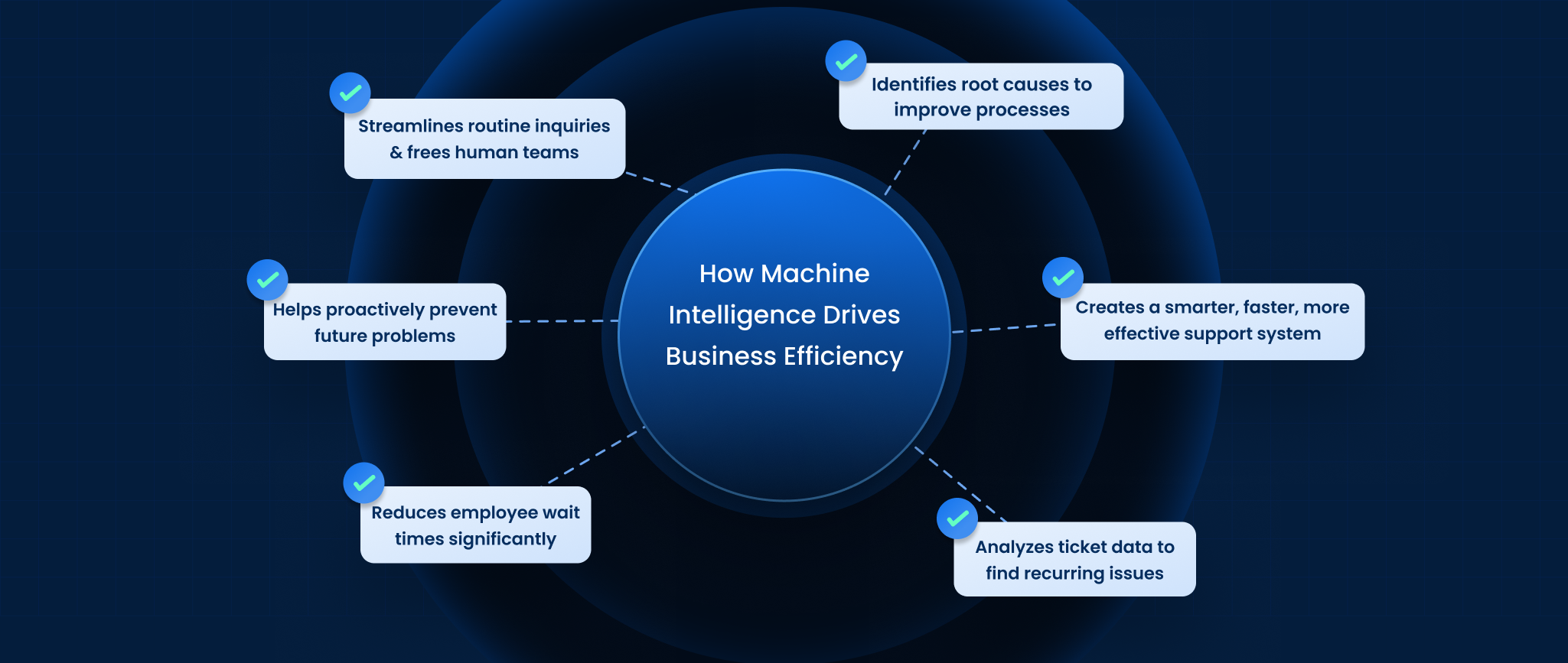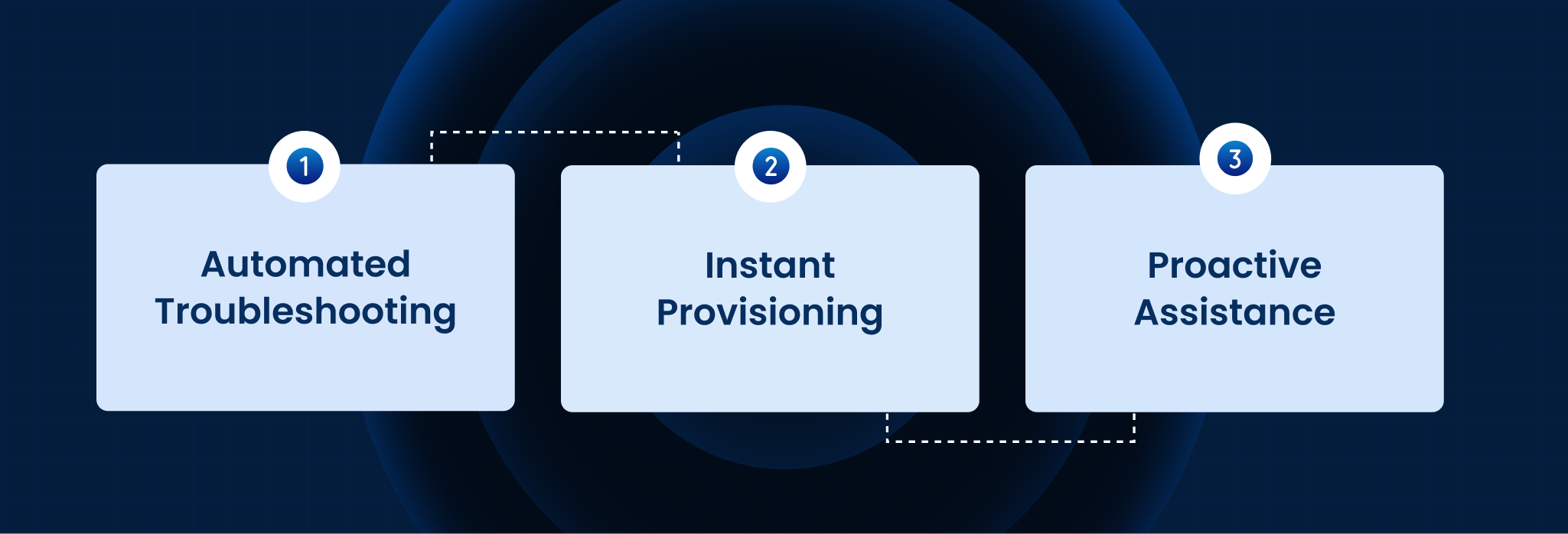Introduction
In 2025, the conversation around enterprise technology isn’t just about efficiency; it’s about strategic transformation. As a CIO, CTO, or Technology Head, you’re constantly seeking ways to elevate your company’s operational backbone, especially in critical areas like IT, HR, and Finance ticketing. The landscape of machine intelligence companies is evolving rapidly, offering solutions that move far beyond basic automation. We’re now seeing intelligent, predictive, and seamlessly integrated systems poised to redefine how employees experience support.
This article explores the cutting-edge trends shaping machine intelligence and highlights the innovative companies leading the charge. We’ll examine how these advancements can help you shift from reactive problem-solving to proactive issue prevention, ultimately enhancing employee satisfaction and driving significant business value.
Defining Machine Intelligence: What It Means for Modern Enterprises
Machine intelligence, often referred to as artificial intelligence or AI, describes systems that can learn from data, reason, understand, and even generate content. For modern enterprises, this means moving beyond simple programmed responses. It involves creating systems that can interpret complex requests, understand context, and make intelligent decisions. These advanced capabilities are crucial for handling the diverse and often nuanced needs of your workforce across IT, HR, and Finance.
Modern machine intelligence goes deeper than just automating tasks; it aims to augment human capabilities. It can sift through vast amounts of information in seconds, identify patterns invisible to the human eye, and predict future outcomes. This predictive power is a game-changer for enterprise ticketing, allowing companies to anticipate issues and address them before they impact productivity. Understanding these core capabilities is the first step in leveraging the power of leading machine intelligence companies.
How Machine Intelligence Companies Drive Business Efficiency
Machine intelligence companies are fundamentally reshaping how businesses operate, particularly in internal support functions. They are driving efficiency by transforming how tickets are managed, resolved, and even prevented. This shift impacts several key areas, leading to tangible benefits for large US companies.
First, these companies offer solutions that streamline routine inquiries. Instead of agents spending time on common password resets or policy questions, intelligent systems can handle these immediately. This frees up your valuable human teams to focus on more complex, high-value problems. Consequently, employee wait times decrease significantly.
Second, machine intelligence provides powerful analytical insights. It can analyze ticket data to identify recurring issues and their root causes. This information is invaluable for improving underlying systems and processes, thus reducing future ticket volumes. Furthermore, by understanding trends, companies can proactively address potential bottlenecks. Overall, embracing these technologies means a smarter, faster, and more effective support ecosystem.

The Evolution from Reactive to Proactive Support: Predictive AI and Issue Prevention
The shift from simply reacting to problems to actively preventing them is a hallmark of advanced machine intelligence companies in 2025. This evolution is driven by sophisticated predictive artificial intelligence. Imagine a system that can foresee a widespread software glitch before it causes any disruption. This is no longer futuristic thinking; it’s becoming today’s reality.
These intelligent systems analyze vast amounts of data, including user behavior, system diagnostics, and historical incident logs. They look for subtle patterns and anomalies that indicate an impending issue. For example, a sudden spike in login failures for a specific application, even before users start reporting it, could trigger a proactive alert. This allows IT teams to intervene and resolve the problem behind the scenes, often before any employee is even aware there was a potential problem.
Furthermore, predictive AI can anticipate individual user needs. If an employee frequently struggles with a particular application, the system might proactively offer relevant training materials or troubleshooting tips. This preventive approach minimizes downtime, reduces the frustration of creating a ticket, and ultimately boosts overall employee productivity. Companies adopting these solutions are seeing a measurable decrease in support requests and a significant improvement in system reliability.
Generative AI for Agent Augmentation and Autonomous Resolution
Another significant trend driven by machine intelligence companies is the rise of generative AI for enhancing support agents and enabling autonomous resolution. This is far beyond the simple rule-based chatbots of yesterday. Generative AI can understand nuanced language, produce coherent and contextually relevant responses, and even complete tasks independently.
For support agents, generative AI acts as a powerful co-pilot. When an agent is interacting with an employee, the AI can analyze the conversation in real-time. It can then instantly retrieve the most relevant knowledge base articles, suggest the next best steps, and even draft personalized responses that the agent can review and send. This dramatically reduces handling times and ensures consistency in support quality, empowering agents to become more efficient and effective.
Moreover, generative AI is increasingly capable of autonomous resolution for a growing number of common requests. It can understand a request like “I need access to the marketing drive” and then, with appropriate permissions, execute the necessary steps to grant access without human intervention. This capability offloads routine tasks, allowing human agents to concentrate on complex, emotionally sensitive, or unique problems. The result is faster resolution times and a more streamlined support experience for everyone.
Hyper-Personalization and Sentient Analysis in Customer Experience
In today’s competitive landscape, employee experience is just as crucial as customer experience. Machine intelligence companies are enabling hyper-personalization and sophisticated sentient analysis to make internal support feel more tailored and empathetic. This means understanding not just what an employee needs, but also how they are feeling when they ask for help.
Sentient analysis tools can process the language used in a ticket or even the tone of a voice during a call to gauge an employee’s emotional state. If an employee expresses frustration or urgency, the system can automatically prioritize their ticket or route them to a specialized agent. This ensures that employees who are struggling receive the attention and empathy they need, exactly when they need it.
Hyper-personalization takes this a step further. Machine intelligence can leverage an employee’s past interactions, their department, their technical proficiency, and even their preferred communication style to customize the support journey. For instance, a tech-savvy developer might receive a direct solution, while an employee less comfortable with technology might get a step-by-step guide with clear visuals. This tailored approach makes employees feel understood and valued, fostering a more positive support experience and increasing satisfaction.
Leena AI: Transforming Employee Experience with Agentic AI
At Leena AI, we are proud to be at the forefront of machine intelligence companies, particularly with our pioneering Agentic AI solutions for enterprise IT, HR, and Finance. Our platform is designed to transform the employee experience by making internal support effortless and efficient. We understand the challenges faced by large US companies in managing thousands of employee tickets daily. That’s why we’ve developed a robust AI agent that acts like an intelligent, always-on colleague for every employee.
Our Agentic AI for IT specifically addresses the pain points of traditional IT ticketing. Imagine an employee needing a quick software update, a VPN issue resolved, or a new printer installed. Instead of waiting on hold or navigating complex portals, they simply ask our AI agent. Our system leverages advanced natural language understanding to comprehend the request, no matter how it’s phrased.
What makes Leena AI stand out is our Agentic capability. This means our AI doesn’t just provide information; it acts. For IT, this translates into:
-
Automated Troubleshooting: Our AI can guide employees through diagnostic steps or even autonomously fix common issues like Wi-Fi connectivity problems or application errors.
-
Instant Provisioning: Need a new software license? Our agent can verify access, process the request, and provision it instantly, cutting down approval and waiting times.
-
Proactive Assistance: Based on system alerts or user behavior, our AI can offer solutions even before an employee realizes there’s an issue, preventing problems from escalating.
By integrating seamlessly with existing enterprise systems, Leena AI ensures that employees get immediate, personalized support for their IT, HR, and Finance needs. We empower enterprises to significantly reduce ticket volumes, improve resolution times, and deliver an unparalleled employee experience. Our Agentic AI acts as a force multiplier for your support teams, allowing them to focus on strategic initiatives rather than repetitive tasks.

Top Machine Intelligence Companies Shaping the AI Landscape
Beyond our own innovations, several other machine intelligence companies are making significant strides in shaping the AI landscape for enterprises. These innovators are pushing boundaries in various domains, from general-purpose AI platforms to highly specialized industry solutions.
For instance, companies like ServiceNow are integrating AI deeply into their IT Service Management (ITSM) platforms, offering predictive intelligence for incident management and virtual agents for self-service. Salesforce also leverages AI, known as Einstein, to enhance customer relationship management (CRM) with predictive analytics and intelligent automation across sales, service, and marketing. Furthermore, tech giants such as Google Cloud, Amazon Web Services (AWS), and Microsoft Azure provide powerful AI and machine learning services that serve as foundational building blocks for many enterprise applications. These services offer scalable computing, pre-trained models, and development tools that businesses can adapt to their specific needs, including sophisticated ticketing solutions. Each of these players contributes to the rich and diverse ecosystem of machine intelligence available to large organizations today.
The Future of Machine Intelligence: Trends to Watch
The future of machine intelligence companies promises even more transformative changes for enterprise support systems. Several key trends are emerging that will further refine how organizations interact with technology and their employees. Keeping an eye on these developments will be crucial for any technology leader.
One major trend is the increased focus on “Explainable AI” or XAI. As AI systems become more autonomous and make critical decisions, understanding how they arrive at their conclusions becomes paramount. This transparency will build greater trust and allow for better auditing and refinement of AI models, particularly in sensitive areas like HR and Finance.
Another trend is the greater integration of multimodal AI. This means AI systems will increasingly be able to process and understand information from various sources simultaneously: text, voice, images, and video. For ticketing systems, this could mean an employee submitting a ticket with a screenshot, a voice memo, and a text description, with the AI seamlessly understanding and acting upon all inputs.
Finally, we will see continued advancements in Federated Learning. This approach allows AI models to learn from decentralized data sources without centralizing the data itself, enhancing data privacy and security. For large companies with sensitive employee data spread across different departments or even regions, this will be a critical development for safely deploying more powerful machine intelligence. These trends collectively point towards a future where machine intelligence is not just a tool, but an integral, intelligent partner in every aspect of enterprise operations.
Frequently Asked Questions
1. What exactly do machine intelligence companies do for enterprise ticketing?
Machine intelligence companies provide AI-powered solutions that automate, predict, and optimize the handling of employee support tickets across IT, HR, and Finance, making processes faster and more efficient.
2. How does machine intelligence help with proactive issue resolution?
These companies develop systems that analyze data to predict potential problems before they occur, allowing teams to resolve issues proactively and minimize disruption to employees.
3. What is Agentic AI, and why is it important for large companies?
Agentic AI refers to intelligent systems that can not only understand requests but also take autonomous action to resolve them. For large companies, it significantly speeds up ticket resolution and reduces the burden on human support staff.
4. Can machine intelligence understand complex, nuanced employee requests?
Yes, modern machine intelligence companies utilize advanced natural language understanding to interpret complex and nuanced requests, providing more accurate and relevant support than traditional systems.
5. How do these companies ensure data privacy and security for employee information?
Leading machine intelligence companies prioritize robust security protocols, data encryption, and compliance with privacy regulations, often leveraging technologies like federated learning to protect sensitive employee data.
6. What are the key benefits of partnering with machine intelligence companies for support systems?
Key benefits include reduced ticket volumes, faster resolution times, improved employee satisfaction, greater operational efficiency, and the ability to free up human agents for more complex tasks.













